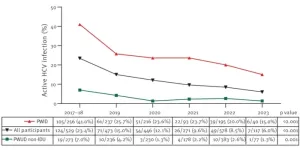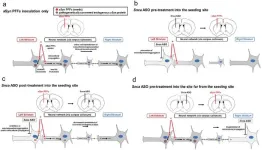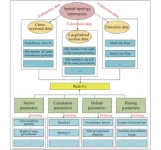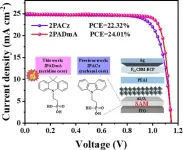(Press-News.org) MND is a devastating disease affecting the motor neurones in the brain and spinal cord, leading to progressive muscle weakness and paralysis. Despite decades of research, several scientific challenges continue to impede the development of effective therapies for the thousands of people living with MND in the UK.
The MND Research Data Catalyst is a new initiative led by HDR UK and DPUK, with the UK Dementia Research Institute (UK DRI) and in partnership with the MND research community, to accelerate the discovery of new diagnostics, treatments and support better care for MND patients. This will be achieved by harnessing the UK’s trustworthy, large-scale health data infrastructure and fostering collaborative partnerships across the MND research landscape.
Dr Rhoswyn Walker, Director of Strategy at HDR UK, said: “MND research faces many complex scientific challenges and there is a huge opportunity to accelerate research into this life-shortening disease by unlocking the power of health data. We are delighted to partner with DPUK, UK DRI and the whole MND research community to build a secure data platform that accelerates trustworthy data use to save lives.”
Professor John Gallacher, Director of DPUK, said: “DPUK is delighted to add to our growing MND portfolio by supporting the MND Research Data Catalyst. We expect the Catalyst will make a fundamental contribution to MND therapeutics; delivering high-quality translation science. Through our project management and SeRP-led informatics solutions, DPUK will provide the necessary infrastructure for rapid project delivery and data access.”
The catalyst is supported by £2 million in funding from the Department of Health and Social Care (DHSC), delivered through the National Institute of Health and Care Research (NIHR). This is part of wider support to grow MND research by the UK government in partnership with charities and organisations including the NIHR, UK Research and Innovation, MND Association, My Name’5 Doddie Foundation, MND Scotland, and LifeArc.
Professor Mike Lewis, NIHR Scientific Director for Innovation, said: "We are pleased to support our partners in the MND Research Data Catalyst. It represents an important next step in our ability to safely and securely open up data in this area to researchers from diverse disciplines, who can hopefully uncover new ways of understanding and treating this debilitating disease and improving the lives of everyone affected by it."
Professor Siddharthan Chandran, Director of the UK DRI, said: “Joining forces with HDR UK, DPUK, and the MND research community to deliver the MND Research Data Catalyst will help drive real change for those affected by this devastating disease. The UK DRI, a hub of mechanistic science powered by molecular data, leads the largest UK clinical trial, MND-SMART, and we are pleased to support this new initiative that will significantly boost UK science in this critical area.”
The MND Research Data Catalyst will be underpinned by the principle of “user-centred design”. Solutions will be co-created with the UK-wide MND research community to ensure that they deliver against an unmet need and enable novel, high-impact research outcomes.
Notes to editor
For more information, contact Debs Mathisen at media@hdruk.ac.uk or +44 7594 514007.
Health Data Research UK is the national institute for health data, accelerating the trustworthy use of health data to enable discoveries that improve people’s lives. It is a charity funded by UK Research and Innovation, the Department of Health and Social Care in England and equivalents in Northern Ireland, Wales and Scotland, and leading medical research charities. https://www.hdruk.ac.uk/
Dementias Platform UK (DPUK) is a partnership between universities, charities, and industry. It has created an infrastructure, facilities and programmes to enable crucial breakthroughs in dementia research. Based at the University of Oxford, it is core funded by the Medical Research Council. Its purpose is to make it easier, better and faster to translate research into therapeutics. The DPUK portal brings data from over 60 cohorts into a single, secure, environment, reducing the need to transfer increasingly large and complex data files between research groups. Data of more than 3.5 million people are hosted on the Portal. It contains rich phenotypic, imaging, genomic and other data. The Portal uses UK-SeRP informatics solutions developed by Swansea University. https://www.dementiasplatform.uk/
The UK Dementia Research Institute (UK DRI) is a globally leading multidisciplinary research institute of over 900 scientists, dedicated to changing the outcomes of people living with or at risk of neurodegenerative conditions. UK DRI is accelerating the discovery, development and delivery of interventions that will help diagnose, treat, and ultimately prevent dementia. Established in 2017 by its principal funder the Medical Research Council, the multi-million-pound Institute is nationally hosted across six leading UK universities: UCL, University of Cambridge, Cardiff University, University of Edinburgh, Imperial College London, and King’s College London. www.ukdri.ac.uk END
Accelerating motor neurone disease research by harnessing the power of health data
2024-07-25
ELSE PRESS RELEASES FROM THIS DATE:
World Hepatitis Day 2024: Madrid study shows decrease in active hepatitis C infection among risk groups, indicating effectiveness of public health measures
2024-07-25
A study conducted through a mobile screening unit in Madrid, Spain from 2017 to 2023 and published in Eurosurveillance found that active hepatitis C virus (HCV) infection decreased from 23% to 6% in that period among people who use drugs (PWUD) that visited the unit. The study found that the use of intravenous drugs was the most significant risk factor for infection among PWUD. It confirmed that HCV screening and treatment programmes targeting this at-risk population are effective and can help achieve the World Health Organization goal of HCV elimination as public health threat by 2030.
Study participants and methods
Participants were recruited in ‘hotspots’ ...
After Trump’s election, women of color had more underweight, premature babies, study finds
2024-07-25
In 2016, President-elect Donald Trump vowed to deport thousands of immigrants. His anti-immigration message vilified foreign-born people living in the U.S. as criminals and rapists. Besides making good on many harsh, immigration-related promises, the years after his election stoked the anxieties of millions of people.
Now, with Trump once again in contention for the White House, a new study from the University of California, Berkeley, reveals the surprising — and potentially lifelong — association between those early Trump years and the health of society's newest citizens.
In ...
Space-trekking muscle tests drugs for microgravity-induced muscle impairment
2024-07-25
A gentle rumble ran under Ngan Huang’s feet as a rocket carrying her research—live, human muscle cells grown on scaffolds fixed on tiny chips—lifted off, climbed, and disappeared into the sky to the International Space Station National Laboratory. These chips would help Huang better understand muscle impairment, often seen in astronauts and older adults, and test drugs to counter the condition.
Now, the results are back. Reporting in a study published July 25 in Stem Cell Reports, Huang’s team showed that space-travelling muscle had metabolic changes that indicate ...
In clinical trial, fecal matter transplant helped half of patients with gastrointestinal cancers overcome resistance to immunotherapy treatment
2024-07-25
Findings from a small, proof-of-concept clinical trial have suggested that fecal microbiota transplants (FMTs) can boost the effectiveness of immunotherapy in a range of gastrointestinal cancers. In the study, published July 25 in the journal Cell Host & Microbe, six of 13 patients who had previously shown resistance to immune checkpoint inhibitors benefited from receiving FMTs from donors who had previously responded to treatment. The investigators also identified specific strains of bacteria associated with better or worse responses to FMT and immune checkpoint drugs.
“This research highlights the complex interplay between beneficial ...
Royal Ontario Museum scientist identifies Great Salt Lake as a significant source of greenhouse gas emissions
2024-07-25
Newly announced research by Royal Ontario Museum (ROM) examining greenhouse gas emissions from the drying lake bed of Great Salt Lake, Utah, calculates that 4.1 million tons of carbon dioxide and other greenhouse gases were released in 2020. This research suggests that drying lake beds are an overlooked but potentially significant source of greenhouse gases, which may further increase due to climate change. These results were announced in the paper, “A desiccating saline lake bed is a significant source of anthropogenic greenhouse gas emissions,” published in the journal One Earth.
“Human-caused ...
Provision of stroke care services by community disadvantage status
2024-07-25
About The Study: Hospitals in communities with the greatest level of socioeconomic disadvantage had the lowest likelihood of becoming stroke certified while hospitals in the most advantaged communities had the highest likelihood in this cohort study. These findings suggest that there is a need to support hospitals in disadvantaged communities to obtain stroke certification as a way to reduce stroke disparities.
Corresponding Author: To contact the corresponding author, Renee Y. Hsia, M.D., M.Sc., email renee.hsia@ucsf.edu.
To access the embargoed study: Visit our For The Media website at this link ...
Bilateral mastectomy and breast cancer mortality
2024-07-25
About The Study: This cohort study indicates that the risk of dying of breast cancer increases substantially after experiencing a contralateral breast cancer. Women with breast cancer treated with bilateral mastectomy had a greatly diminished risk of contralateral breast cancer; however, they experienced similar mortality rates as patients treated with lumpectomy or unilateral mastectomy.
Corresponding Author: To contact the corresponding author, Steven A. Narod, M.D., email steven.narod@wchospital.ca.
To access the embargoed study: Visit our For The Media website at this link https://media.jamanetwork.com/
(doi:10.1001/jamaoncol.2024.2212)
Editor’s ...
Antisense oligonucleotide treatment shows promise in treating Parkinson's disease progression
2024-07-25
TMDU researchers demonstrate proof of concept of antisense nucleic acid therapy to prevent the spread of α-synuclein pathologies in synucleinopathies.
Tokyo, Japan – Parkinson’s disease (PD), as well as many other neurodegenerative disorders, has shown a link between the abnormal aggregation of a protein called α-synuclein (aSyn) and neuronal death. These aggregates, known as Lewy bodies and Lewy neurites depending on their subcellular localization, can spread by continuously causing normal endogenous aSyn to misfold. The complex nature of this aggregation process poses significant challenges ...
Intelligent engineering: AI transforms spatial arrangement of hydropower underground facilities
2024-07-25
Designing the spatial arrangement of underground powerhouses involves numerous complex parameters and boundaries, requiring frequent reference to various cases and specifications. Traditional methods struggle to efficiently retrieve this information, leading to suboptimal designs and extended project timelines. Due to these challenges, there is a pressing need for a more intelligent and efficient approach to streamline the design process, enhance accuracy, and improve project management in hydropower engineering.
Researchers from Tianjin University, in collaboration with PowerChina Kunming Engineering Corporation Limited and other ...
Unlocking new potential in solar tech: dimethyl acridine enhances perovskite solar cells
2024-07-25
Perovskite solar cells (PSCs) are highly regarded for their exceptional performance and straightforward fabrication. However, traditional hole transport layers (HTLs) like Poly (triarylamine) (PTAA), Nickel Oxide (NiOx), and poly (3,4-ethylenedioxythiophene)-poly (styrenesulfonate) (PEDOT) have inherent limitations that impede efficiency and stability. These materials often suffer from issues such as hydrophobicity, high reactivity, and acidity, which negatively affect the overall performance of PSCs. Due to these challenges, there is a pressing ...





